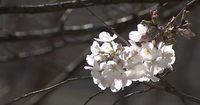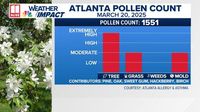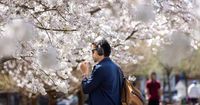ATLANTA — Spring has officially begun in North Georgia, bringing with it the accompanying arrival of pollen. On Thursday, March 20, 2025, the pollen count in Atlanta soared to 1,551, marking the first time this season that levels reached the "extremely high" threshold. According to reports from Atlanta Allergy and Asthma, this count is indicative of heightened pollen levels, primarily from tree sources.
The count is compiled daily using a specialized collection device that gathers pollen grains and mold spores over 24 hours. This data is then analyzed by pollen lab technicians who determine the types and numbers of the pollen grains present. The main contributors to today’s pollen count included pine, oak, sweet gum, hackberry, and birch tree pollens.
Residents who suffer from allergies have already been feeling the impact of increasing pollen levels, as tree pollen counts jumped into the "high" range back in mid-February and have persisted in the "moderate" to "high" ranges since. Typically, peak levels occur from the end of March into early April, suggesting that many allergy sufferers could be bracing for a tough few weeks ahead.
Pollen counts in Atlanta historically reach the "extremely high" range about 12 to 13 days per season on average, although some years have seen figures much higher. Notably, pollen count records soared as high as 9,369 in 2012.
While precipitation early on March 20 may have offered a brief respite from pollen levels, the breezy conditions anticipated for the afternoon could warrant additional pollen dispersal throughout the area.
Adding to this season’s challenges, the National Oceanic and Atmospheric Administration forecasts that North Georgia will likely experience temperatures above average this spring, with highs returning consistently to the 60s and 70s starting Friday, March 21. The chance of above-average temperatures is pegged at 40-50% in North Georgia, while South Georgia’s probability is slightly higher at 50-60%.
Average high temperatures generally begin in the mid-60s during March, climbing into the low 80s by May. However, the NOAA warns that deep South Georgia may see less rain than normal, which could exacerbate any existing drought conditions and contribute to an increased risk of wildfires.
Spring is also synonymous with severe weather in this region. Residents were reminded to stay vigilant as meteorologists pointed to instances like the tornado that touched down in Paulding County on late Saturday, March 15. Frequent forecasts of volatile weather systems will be typical as the season progresses.
Additionally, as springtime ushers in warmer weather, environmental conditions favoring plants proliferate. This means the city will witness longer daylight hours in the lead-up to summer, further enhancing pollen production. For allergy sufferers, the rise in tree pollen levels can lead to visible yellow dust across surfaces—an allergy-triggering sight.
Tree pollen from hardwood trees such as oak, hickory, and birch generates an invisible, powdery release that can cause uncomfortable bouts of itchy eyes and runny noses. Residents can track daily pollen counts through resources like the Atlanta Allergy & Asthma's certified Pollen Counting Station, available online at atlantaallergy.com.
Meanwhile, the onset of spring also marks the beginning of gardening season. Local gardening experts suggest that Atlanta residents typically can start planting around April 15 once the last risk of frost has passed. While some durable plants can be introduced into the soil earlier, caution is advised for any frost-sensitive plants that may need protection should temperatures dip unexpectedly.
As the region transitions into warmer conditions, residents are also advised to remain vigilant regarding snake encounters. As temperatures rise, snakes emerge from their hibernation spots seeking sun. Each year, Georgia reports approximately 450 to 550 snake bites, of which only a quarter require antivenom treatment. Notably, only seven out of the 47 snake species in Georgia are venomous, including the copperhead, which is the most frequently reported species in urban areas.
Whether gardening or enjoying the outdoors, it's crucial to stay aware of snake activity. Experts recommend leaving any spotted snakes alone—most will retreat when unprovoked. For those who love the outdoors, preparation is key to navigating both the increased pollen levels and the natural wildlife that comes with the changing seasons.
As Atlanta embarks upon yet another vibrant spring, a blend of varying temperatures, rich plant activity, and surprising wildlife will characterize the season, encouraging residents to embrace the beauty while staying informed about upcoming challenges.






